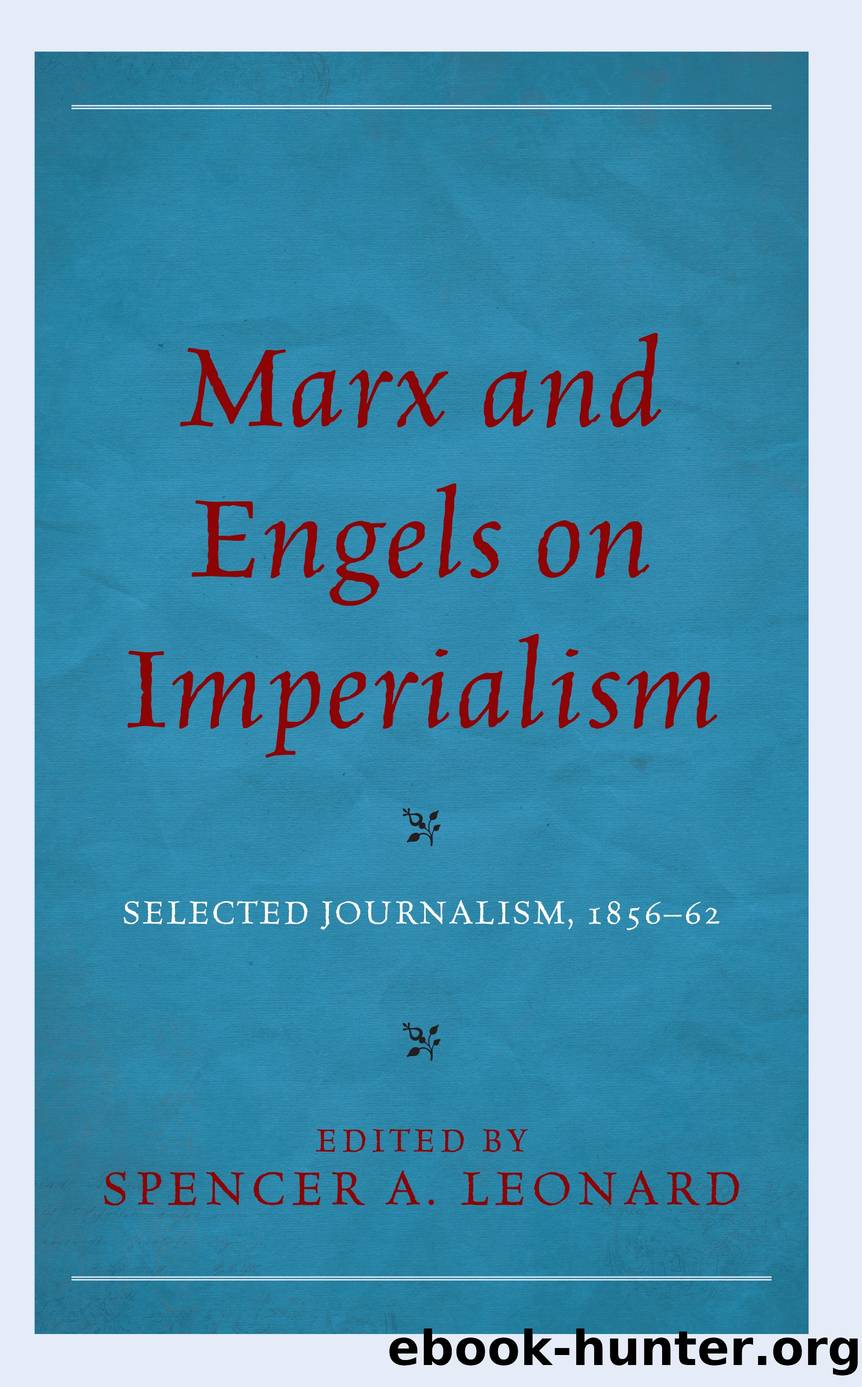Marx and Engels on Imperialism by Spencer A. Leonard

Author:Spencer A. Leonard
Language: eng
Format: epub
Publisher: LEXINGTON BOOKS
Published: 2023-03-04T00:00:00+00:00
Notes
1. Whereas most were content to obfuscate and self-deceive, after the Stalinization of Marxism, the consolidation of fascism, the death of Trotsky, and the outbreak of World War II, the Frankfurt School pursued the question of imperialism under conditions of collapse. See, inter alia, Theodor W. Adorno, âReflections on Class Theoryâ [1942] (New York: Columbia University Press, 1998), 93â110; Max Horkheimer, âThe Authoritarian Stateâ [1942]; Otto Kirchheimer, âChanges in the Structure of Political Compromiseâ Zeitschrift für Sozialforschung 9:2 (1941), 264â89; and Friedrich Pollock, âState Capitalism: Its Possibilities and Limitationsâ [1941], in Essential Frankfurt School Reader, 71â94.
Perry Andersonâs remarks on the subject of Marxâs concept of bonapartism in his 1976 Considerations on Western Marxism typify the capitulation to Stalinism by leading thinkers of the New Left. Marx is, Anderson writes, more âpolitically and theoretically central to the later twentieth centuryâ than he is to his own time, with which he is somehow âout of synchrony.â Marx is to be brought before Andersonâs conception of the twentieth century and assimilated to it. He never allows Marx to challenge his categories of âbourgeois democracyâ and the âmodern bourgeois state.â Indeed, Anderson demonstrates small familiarity with Marxâs writings on the imperialist state. His confusion arises from his search in Marx for his own preoccupation, âbourgeois class power.â Hereâs what he wrote nearly half a century ago,
[Marxâs] early writings started to theorize, in effect, the structures of what was later to be bourgeois democracy, before it existed anywhere in Europeâbut at a very abstract and philosophical level. Then in 1848â50 he wrote a concrete, historical study of the peculiar dictatorial state created by Napoleon III in Franceâhis only such venture. Thereafter, he never directly analyzed the English parliamentary state under which he lived for the rest of his life. If anything, he tended to generalize âBonapartismâ abusively as the typical form of the modern bourgeois state, because of his political memories of its counterrevolutionary role in 1848. He was consequently unable to analyze the Third Republic in France, when it emerged after the defeat of 1870. Finally, because of his preoccupation with âmilitaristâ Bonapartism, he seems by contrast to have tended to underestimate the repressive capacity of the âpacifistâ English, Dutch and American states, at times appearing to think that socialism could be achieved in these countries by peaceful and electoral means alone. The result was that Marx never produced any coherent or comparative account of the political structures of bourgeois class power at all. . .
Allied to this failure seems to have been an incomprehension of much of the nature of the later epoch through which he lived. Although Marx was alone in his lifetime in understanding the economic dynamism of the capitalist mode of production after 1850, which was to transform the world, he seems never to have recognized the great shift in the international state system that accompanied it. The defeats of 1848 appear to have convinced Marx that bourgeois revolutions could no longer occur, because of the fear that capital now everywhere had of labour.
Download
This site does not store any files on its server. We only index and link to content provided by other sites. Please contact the content providers to delete copyright contents if any and email us, we'll remove relevant links or contents immediately.
Women and Jewish Marriage Negotiations in Early Modern Italy by Howard Tzvi Adelman(462)
Warrior King by Wilbur Smith(426)
The Battle of Austerlitz by 50minutes(319)
18 real-life stories of serial killers and murderers with solved and unsolved killings from the USA, UK, Europe, and beyond. by Ben Oakley(314)
Youth, Heroism and War Propaganda: Britain and the Young Maritime Hero, 1745â1820 by D. A. B. Ronald(308)
Violence and Emotions in Early Modern Europe by Susan Broomhall;Sarah Finn;(305)
Who's Who in the Zulu War, 1879: The British by Adrian Greaves Ian Knight(303)
The American Crisis by Unknown(298)
The Seeker by S. G. MacLean(253)
The Origins of French Absolutism, 1598-1661 by Alan James(247)
The Dutch East India Company and British East India Company: The History and Legacy of the Worldâs Most Famous Colonial Trade Companies by Charles River Editors(240)
The Traitor of Colditz by Robert Verkaik(237)
The Thirty Years War â Complete by Friedrich Schiller(229)
A Genius for Confusion by Richard M. Fried(226)
Fires of Faith by Catholic England under Mary Tudor(224)
Interest and Connection in the Eighteenth Century by Jacob Sider Jost(223)
Invisible Worlds by Peter Marshall(220)
The Slave Trade in Africa by Simon Webb;(220)
The Opium Wars: Exploring the Addiction of Empires from Beginning to End by Ramos Adrian & Compacted History(217)
